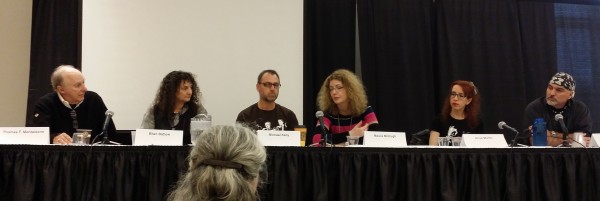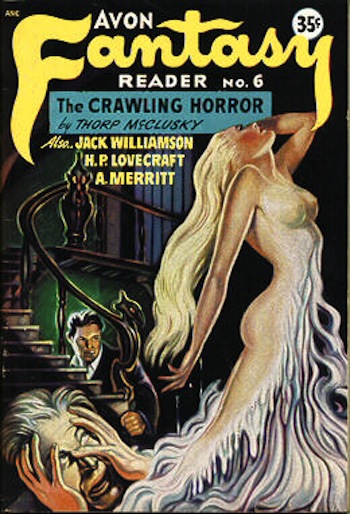November 7, 2015, World Fantasy Convention, Saratoga Springs, NY
Moderator: Thomas F. Monteleone. Panelists: Ellen Datlow, Michael Kelly, Anya Martin, Maura McHugh, Scott Nicolay
Description: When and where do they converge and converse?
 Writers and editors discuss the roots and history of Weird fiction back to Weird Tales, 19th century authors and even The Iliad, editors’ perspectives on the Weird in their own work experiences, the Weird tale as independent of tropes, early definitions of the Weird by Le Fanu as a gothic supernatural tale and Lovecraft as dread-ridden cosmic horror, its evolution to an increasingly fluid and open vision and variety in the explosion of Weird fiction today, tapping into the strangeness of reality and the element of the unexplained but why not all odd stories are weird stories, where Weird tapers and becomes surreal, whether Weird fiction needs darkness as an ingredient and when fantasy and science fiction becomes Weird, writer Gemma Files’ suggestion from the audience that the nuance may lie in how the characters react to the Weird in the story, scares versus unease, David Lynch as Weird filmmaker, why keeping a wide open definition is better for nurturing the Weird, a peek inside the editorial process behind The Year’s Best Weird Fiction and the value of changing editors every year, the growing interest in the weird outside the spec-lit community and the upcoming Wave from Hollywood and mainstream publishing, a possible danger in letting the outside world define the weird, keeping the door open as long as we can, the role of the small presses in driving the Weird explosion, Weird as a pre-existing condition, Weird fiction in the novel form, the future of Weird fiction, the recurring theme in weird fiction of the environment rising up including when the environment is a house, when ghost stories can be weird stories, the etymology of the word “Weird” in the Anglo-Saxon “Wyrd” and its many connotations including fate/destiny/transformation, why the word “Weird” is Weird itself, following the River to an inevitable destiny versus appeal of unpredictability to the reader, Jack Spicer’s Martian, and many, many recommended authors from the 19th century to now.
Writers and editors discuss the roots and history of Weird fiction back to Weird Tales, 19th century authors and even The Iliad, editors’ perspectives on the Weird in their own work experiences, the Weird tale as independent of tropes, early definitions of the Weird by Le Fanu as a gothic supernatural tale and Lovecraft as dread-ridden cosmic horror, its evolution to an increasingly fluid and open vision and variety in the explosion of Weird fiction today, tapping into the strangeness of reality and the element of the unexplained but why not all odd stories are weird stories, where Weird tapers and becomes surreal, whether Weird fiction needs darkness as an ingredient and when fantasy and science fiction becomes Weird, writer Gemma Files’ suggestion from the audience that the nuance may lie in how the characters react to the Weird in the story, scares versus unease, David Lynch as Weird filmmaker, why keeping a wide open definition is better for nurturing the Weird, a peek inside the editorial process behind The Year’s Best Weird Fiction and the value of changing editors every year, the growing interest in the weird outside the spec-lit community and the upcoming Wave from Hollywood and mainstream publishing, a possible danger in letting the outside world define the weird, keeping the door open as long as we can, the role of the small presses in driving the Weird explosion, Weird as a pre-existing condition, Weird fiction in the novel form, the future of Weird fiction, the recurring theme in weird fiction of the environment rising up including when the environment is a house, when ghost stories can be weird stories, the etymology of the word “Weird” in the Anglo-Saxon “Wyrd” and its many connotations including fate/destiny/transformation, why the word “Weird” is Weird itself, following the River to an inevitable destiny versus appeal of unpredictability to the reader, Jack Spicer’s Martian, and many, many recommended authors from the 19th century to now.
However, as these drugs cause addiction and their action becomes less expressed, Tramadol 100mg is just a step between the NSAIDs and narcotic analgesics.
Thanks to Stephen Barringer for the panel photo.
This archival episode will be available again at This Is Horror soon. In the meantime, subscribe at iTunes or Blubrry to make sure you don’t miss an episode.
More links:
https://borderlandspress.com/
https://www.hplovecraft.com/writings/texts/essays/shil.aspx
https://weirdfictionreview.com/2011/11/dogme-2011-for-weird-fiction-by-scott-nicolay/
https://weirdfictionreview.com/2014/11/the-expanding-borders-of-area-x/
 “We must make friends with the many-tentacled alien idea.”
“We must make friends with the many-tentacled alien idea.”


